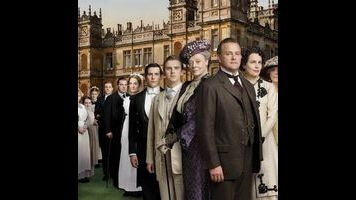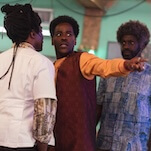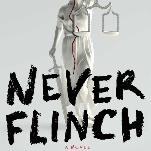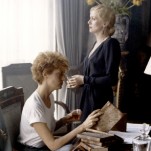For period-piece junkies, the first season of Downton Abbey was like a batch of pure, unadulterated heroin. The series had everything: sumptuous costumes, a picturesque setting, bickering sisters, dashing men on horseback, thwarted romantices. Downton Abbey was obviously derivative of shows like Upstairs, Downstairs and books by Austen, Dickens and Waugh, but what it lacked in originality it more than made up for with fun. It was a saucy, fast-paced, and slyly self-aware soap opera that never took itself entirely seriously. Indeed, this playfulness is what made Downton Abbey so popular, even among those poor, misguided souls who don’t usually like costume dramas.
One the things that made the first season of Downton Abbey such wicked fun was that nearly everyone was capable of behaving badly, or at least naughtily. Most obvious was the fickle and headstrong Lady Mary, who shagged a hot Turkish diplomat to death, dumped Matthew when it appeared he was no longer the heir to Downton, and then sabotaged her sister Edith’s romance out of spite. Mary was a huge pain in the ass, but she was also vulnerable and strangely likable. Julian Fellowes' other characters were just as richly drawn: Anna and Bates radiated goodness without being boring, and even the scheming O’Brien was driven by insecurity rather than pure malevolence. The only truly cartoonish character was Thomas, the conniving gay footman, but he added a delightful dash of camp to the series.
Season two of Downton Abbey picks up two years into the Great War, and, much to my chagrin, everyone—or nearly everyone, anyway—is suddenly on their best behavior. Fellowes has taken a cast of wonderfully complex characters and grouped them into two clear categories—the good guys and the villains. This simplified moral landscape makes sense given the historical context, perhaps, but it's also sort of a bummer.
The episode opens in the filthy trenches of The Somme, where Matthew is (of course) bravely fighting for his country. “When I think of my life at Downton it seems like another world,” he tells a comrade. But as we learn, things at Downton are not quite the same, either. Let's enumerate the various changes, shall we?
In honor of the class system, we’ll begin upstairs with Lady Mary. She returns from London only to learn that Matthew will be at Downton—as will his new fiancé, Lavinia Swire. It will be the first time they've seen each other since the outbreak of the war, and Mary apparently has not yet read that copy of He's Just Not That Into You that Anna lent her a little while back. Everyone is nervous about the encounter, but Mary handles it like a champ, even after Matthew ignores her glances from across the room. “I’m very glad to see you looking so well,” she says, putting on a brave face.
Happily, the awkwardness doesn’t last for long. Soon enough, Mary and Matthew are back to being friends, and Mary even manages to be completely gracious to the sweet-but-dull Lavinia. Fearing that Matthew might not return from the front, Mary shows up at the train to give Matthew an old stuffed dog as a good-luck charm. Her unresolved feelings are heightened by the very real possibility of Matthew’s death. In the most moving scene of the episode, Mary prays for his safe return. She's obviously uncomfortable about turning to God (“I don’t pretend to have much credit with you,” she tells him), and Edith's taunts don't help much, but her desperation is palpable.
When Matthew returns, alive and well, the following April, Carson encourages Mary to make her feelings known: “Even if he’s killed, and he may be, you won’t be sorry.” Just when Mary’s worked up the nerve to talk to Matthew, she happens upon Lavinia, crying her eyes out in the garden, and decides not to go ahead with it. Can you blame her? Mary was certainly more fun when she was hopping into bed with mysterious strangers, and a small part of me wishes she’d just be more ruthless in her pursuit of Matthew, but heartbreak has clearly transformed her into a stoic pragmatist. Her transformation is one that I'm buying, at least for now.
With Matthew out of the picture, Mary is pursuing Sir Richard Carlisle, a wealthy publisher of tabloid newspapers. Richard’s got plenty of money, but he’s nouveau riche, a cretin who doesn’t know that hunting and walking require different types of tweed. Mary is slightly damaged goods (girlfriend has to be, like, 24, by now), and Richard is an indication of her relative undesirability in the high-society marriage market.
Like Mary, Richard is self-confident and socially ambitious. He’s obviously a creep, but Mary doesn’t yet have a good reason to distrust him. (Based on that heated argument with Lavinia, it’s only a matter of time until she does.) In Mary he’s found a good partner, if not a romantic match, and he tells her as much when he proposes. It’s clear that although she longs for something more, Mary can see the benefits of a matrimonial alliance with Richard and at the end of the episode, Mary asks Anna she’s going to accept. “If you love him more than anyone in the world, then you should,” says Anna, which might just be her polite way of telling Mary not to do it.
Mary is not the only Crawley daughter dealing with matters of the heart. Sybil demures when Branson, the family’s Irish chauffeur, confesses to his feelings for her. While we all knew romance was in the works between these two, Branson’s behavior still seemed a bit rash, didn’t it? Luckily, she has her work as a nurse to keep her distracted, though it’s unclear how long she’ll be able to keep Branson waiting for an answer. Like Sybil, Edith finds a sense of purpose outside the house—in her case, driving a tractor for a local farmer. It’s nice to see the shrewish Edith lightening up a bit, but her flirtation with Mr. Drake was unconvincing and strangely rushed, over before it even began.
Speaking of things that were over before they began, for a few minutes there it seemed as if Anna and Bates would finally be able to be together. Bates returns from his mother’s funeral with some happy news: his wife has, at long last, agreed to a divorce. All he had to do was fork over his entire inheritance. Cue the tears and the awkward kisses! Their happiness, though, is short-lived. Seemingly the next day, Vera shows up to say she’s changed her mind. (Her totally vague reasoning? It's just “too hard” on her own.) If Bates doesn’t agree to go with her, she’s going to tell the papers about Mary and Mr. Pamuk. As impossibly selfless as ever, Bates agrees to go with Vera, offering no explanation to Anna or to Lord Grantham. Fellowes is obviously trying to drag out this storyline for as long as humanly possible, but the complications are becoming Byzantine. Vera’s behavior is irrational, even for a crazy bitch, and the abrupt turns in the narrative are enough to give you a case of whiplash.
For the men of Downton Abbey, the war is an opportunity to prove one’s devotion to king and country—or to out one's self as a coward. Naturally, Lord Grantham is disappointed to find out that his position in the army is merely an honorary one. “Both of my footmen have gone to war while I cut ribbons and make speeches,” he grumbles. (Confession: Lord Grantham is the character whose unwavering valor I find the most tedious). Despite Violet’s scheming, William is called up for service and happily accepts, in contrast to Molesley, who weasels out of it with excuses about his weak lungs. Sweet Mrs. Patmore is heartbroken to discover that her beloved nephew has been shot for cowardice, and terrified that others will find out. Then there's Thomas, who’s such a chicken that he’s willing to have his hand blown off if it means he can return home safe. While these issues of bravery and service were no doubt on the minds of many British men in 1916, it’s a little disconcerting to see Downton Abbey take such a starkly moralistic turn, and approach the subject with so little subtlety. At least Lang, the shell-shocked valet who arrives in the episode’s second hour, provides a small dose of skepticism about the war; here's hoping for more.
Stray observations:
- First, a housekeeping note: While I know that Downton Abbey has already aired in the UK, and that many US viewers have already watched it online, I am going to pretend to know nothing about what comes next. While I don’t expect all of you to do the same, I do hope that you’ll clearly mark any spoilers in the comments below with a nice, bold SPOILER ALERT. Thank you kindly.
- Downton is about to be transformed into a convalescent home. How is Violet going to tolerate all those unsightly cripples running around the house?
- Archibald Filpotts is officially in the running for the title of Most English Name Ever (alongside Benedict Cumberbatch and Rupert Penry-Jones).
- Most unintentionally funny line of the episode: “This tweed is too thick.”
- Mary wins the title of best-dressed for the beige and black beaded number she wore to dinner.
- So far, we haven’t gotten a line from Violet to match “What’s a weekend,” but “Cora’s flowers always look suited to a First Communion in Southern Italy” was pretty great, and I also liked when she called Lavinia “that blonde piece.”
- One character whose behavior just doesn’t make sense is Cora. Why does she go out of her way to secure a place for Thomas at the hospital, especially given his reputation? Is it just to make O’Brien happy?
- Speaking of which, wouldn’t Cora have penalized O’Brien for sending Ethel to interrupt their dinner?
- Like Edith’s flirtation with the farmer, the subplot with Thomas and Lieutenant Courtenay felt incredibly rushed, which is too bad—it wouldn’t hurt to have seen more of Thomas’ vulnerable side.
- (The friendship between Carson and Mary probably isn’t very realistic, but I still find it quite endearing.)
- How did Vera know about Mary and the Turk, anyway?








































